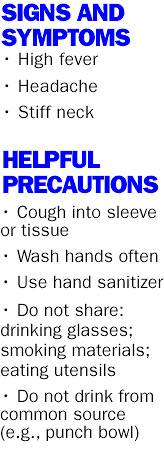A Princeton University student who traveled to his home state Sunday is receiving treatment in a hospital there after he was diagnosed with meningitis Monday morning.
Three other cases of meningitis associated with the University since March were caused by meningococcal bacteria known as type B, which has no effective vaccine but can be treated with common antibiotics. Health officials are conducting tests to determine the type of bacteria in the most recent case.
The University is coordinating its response with regional and state health officials and, as with the previous cases, those who had close contact with the student are being notified so they can receive any needed medical attention. State law requires all Princeton students living in dorms to have received the meningitis vaccine, which protects against most strains of the bacteria.
Bacterial meningitis is contagious, but generally is transmitted through direct exchange of respiratory and throat secretions by close personal contact, such as coughing, sharing drinks, kissing and being in close proximity for an extended period. Fortunately, none of the bacteria that cause meningitis are as contagious as the common cold or the flu, and they are not spread by casual contact or by simply breathing the air where a person with meningitis has been.
Signs and symptoms of bacterial meningitis could include high fever, headache and stiff neck. These symptoms can develop over several hours, or they may take one to two days. The average incubation period is four days, but it can range between two and 10 days.
Members of the University community who experience symptoms or have health concerns should immediately go to the nearest hospital emergency room or visit the University’s McCosh Health Center or call (609) 258-3141 during business hours, and (609) 258-3139 after hours. Those who are planning to travel abroad should inform their physicians about this notification and seek advice.
The previous cases include a student who developed symptoms of meningitis when returning to the area and went directly to the hospital in March; a visitor on campus who was diagnosed with bacterial meningitis after returning to another state in April; and a student who received treatment at a local hospital after developing symptoms on campus May 6.
University Health Services and the Office of Environmental Health and Safety are encouraging members of the University community to pay increased attention to personal hygienic practices. People at high risk of infection include those with terminal complement deficiency, smokers, and those whose spleen is damaged or has been removed.
Helpful precautions include:
- Always coughing into a sleeve or tissue, washing hands frequently, and using hand sanitizer often.
- Not sharing drinking glasses, cigarettes, other smoking material, eating utensils, or drinking from a common source, such as a punch bowl.
The University will continue to provide reminders and additional information about taking precautions to help limit the spread of disease.
More information about bacterial meningitis is available on the Centers for Disease Control and Prevention website. The University has posted additional information online.
